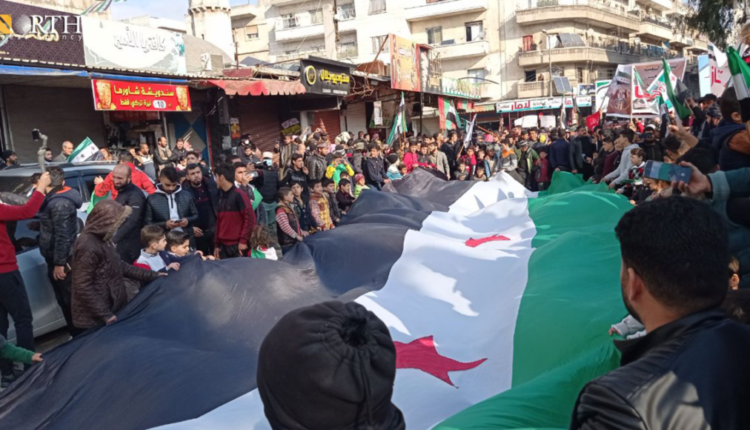
RAQQA, Syria (North Press) – Political observers and civil activists in Syria are in agreement over the likely fate of the Syrian opposition-held areas in the northwest of the country should Turkey’s recent policy of normalization with the Syrian government come to fruition.
After more than a decade of hostility between Syria and Turkey, Turkish-Syrian rapprochement is looming.
The first meeting, bringing together the defense ministers of Turkey, Syria, and Russia, was held in Moscow in December 2022.
Different categories
Should a normalization take place, the armed Syrian opposition factions (also known as the Syrian National Army, or SNA) will likely be classified into three categories, says Syrian political writer Ahmad al-Durzi.
The first category includes the foreign nationals in northwestern Syria, otherwise known as the ‘jihadists’, from regions such as China’s Xinjiang, the Caucasus and Chechnya. This category will be pushed out of Syria, or they will remain under house arrest in Turkey, al-Durzi told North Press.
The second category, comprising the opposition members who have been active militants, will be either obliterated or expelled from the country, al-Durzi added.
As for those who had no choice but to join the civil or military opposition institutions – the ‘third category’ – they will be able to return to their homes after reconciliation agreement.
The writer alleges that Turkey is behind recent military attacks carried out by Hayat Tahrir al-Sham (HTS, formerly Jabhat al-Nusra) in the de-escalation zone in northwestern Syria.
He explained that Turkey is forcing the Syrian government to make a tough choice: normalization with Turkey or ongoing clashes with opposition forces.
On January 10, HTS carried out an infiltration operation against Syrian government forces under the slogan ‘we will not reconcile’ – a response to recent normalization efforts between Ankara and Damascus.
The source stressed that the operation, which was carried out in the Aleppo Governorate, was a practical rejection of that process. Al-Jolani, the leader of HTS, himself stressed that his group has prepared itself for “hard coming days,” without further clarification.
Radwan al-Atrash, an oppositionist political activist, said that the areas extending from southern Idlib to Jarabulus were “liberated” by the blood and sweat of opposition forces.
“Turkey does not have any right to seek its interests with any regime in the world by ignoring the Syrian sacrifices,” he added.
No reconciliation
The activist believes that the “revolution” against the Syrian government “was not a Turkish or European plan, nor was it dictated by any other country, but was a people’s revolution against this criminal regime.”
He points out that the opposition-held areas in northern Syria, “with its vast geography, population, and revolutionary forces, will decide the fate of normalization.”
Al-Atrash asserts that “all those living in the liberated areas in northern Syria firmly reject Turkey’s normalization with the Syrian regime.”
On January 6, several areas in Idlib, as well as other regions held by the Turkish-backed SNA factions, witnessed mass protests by activists and residents, expressing their rejection of the Syrian-Turkish normalization, following the trilateral meeting in Moscow.
Mustafa Abdi, director of the Syrian Violations Documentation Center (VDC), believes that the Syrian opposition is completely subordinate to Turkey, who directs them according to its interests.
“The Turkish-Syrian agreement, if it takes place, will not be different from any other agreements that Turkey has been part of, such as the reconciliation agreement between the opposition and the Syrian government in Aleppo and Rif Dimashq,” he added.
The human right activist noted that what is happening today was Turkey’s plan from the onset, “as it granted Turkish citizenship to most of the opposition faction leaders and officials of the security services.”
He believes that the protests are a reaction. “These protesters rejected the previous agreements as well, by protesting in Eastern Ghouta, Eastern Aleppo, the Hama countryside, Homs, Daraa, Saraqib, and others, then they were forced to leave.… Now they have nowhere else to go.”
“Any agreement will come at the expense Turkish-backed groups in Syria, and I believe that the reconciliation should include them, or a battle may ensue,” he concluded.
